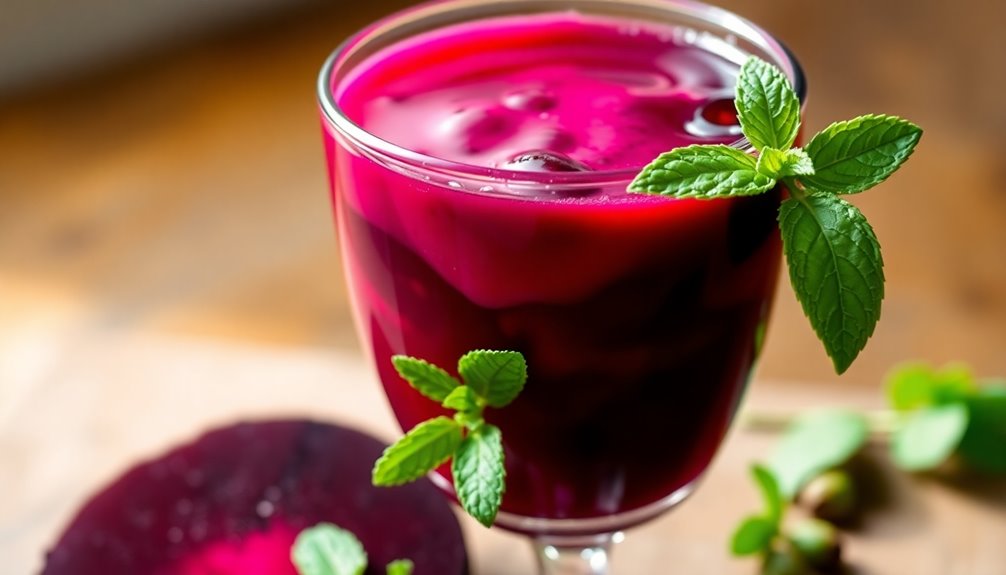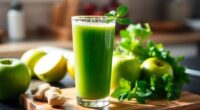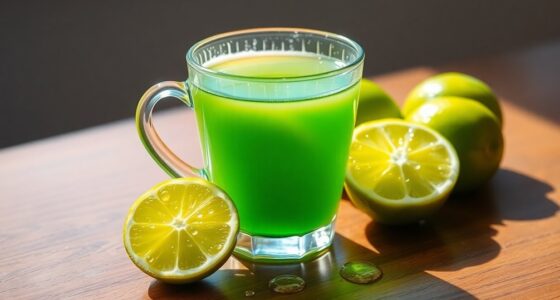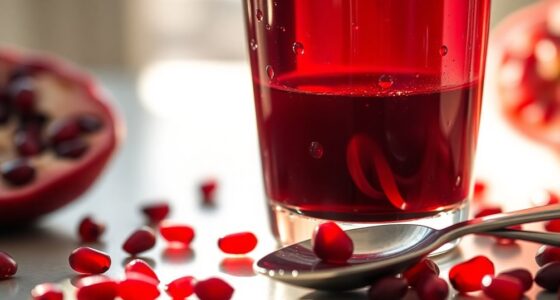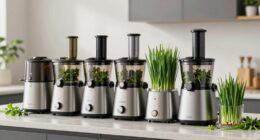Beet juice has a distinct earthy taste that can be quite polarizing. You might love its robust profile, or you could find it overwhelming and off-putting. Fresh beet juice may even have a metallic aftertaste. However, roasting beets can sweeten their flavor and soften the earthy notes. Adding ingredients like lemon, apples, or ginger can also help balance the taste. If you're curious about ways to enhance the flavor, there's plenty more to explore.
Key Takeaways
- Beet juice has a signature earthy taste, which some find delightful while others may find off-putting or overwhelming.
- Fresh beet juice may exhibit a metallic aftertaste or hint of bitterness due to its natural compounds.
- Roasting beets enhances their sweetness, resulting in a smoother and nuttier flavor profile.
- Adding ingredients like lemon juice, apples, or ginger can balance and brighten the flavor of beet juice.
- Personal taste preferences vary widely, so experimenting with recipes is key to finding an enjoyable beet juice blend.
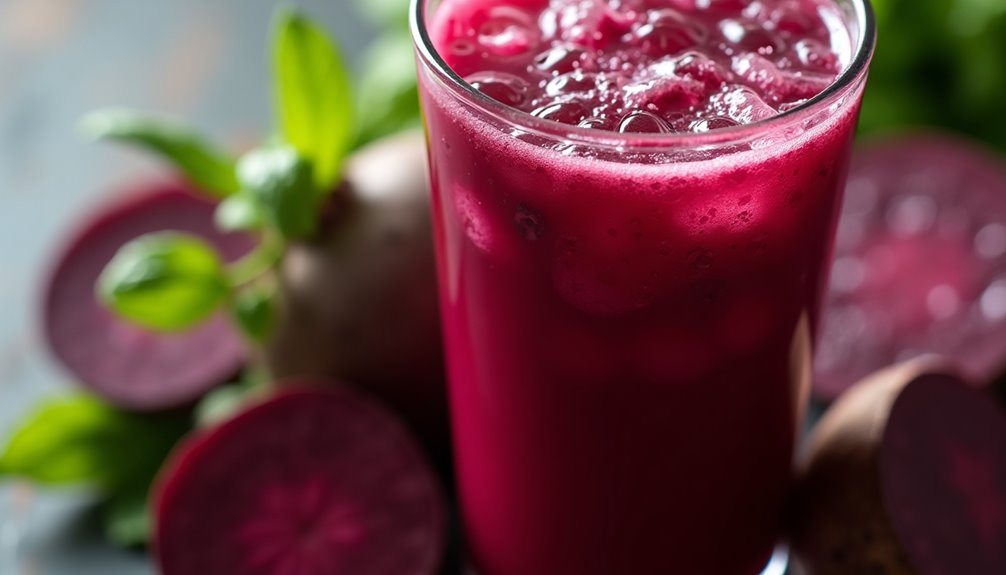
Have you ever wondered how beet juice tastes? If you're curious, you might be surprised by the flavor of beet juice, which can be quite distinct. When you first take a sip, you'll notice its earthy taste, a signature characteristic that comes from the beetroot itself. Some people find this taste delightful, while others may find it a bit off-putting. The strong, unique profile can be overwhelming, especially if the beets aren't prepared properly, so it's essential to consider how you're juicing them.
One factor that contributes to the earthy taste is geosmin, a compound found in beets. This compound can intensify the earthiness, making it more pronounced. If you're looking for a way to soften that flavor, you might consider roasting the beets before juicing. Roasting enhances their natural sweetness, leading to a smoother, nuttier flavor that can make the juice more palatable. The sweetness from roasted beets can balance out the strong earthiness, making it a more enjoyable experience.
When it comes to tasting beet juice, many people notice a metallic aftertaste or even a hint of bitterness, especially when it’s consumed fresh. If you’re one of those who find this unappealing, don’t worry; there are ways to improve the taste. Adding complementary ingredients can make a world of difference. For instance, incorporating lemon juice not only adds a zesty kick but also cuts through the earthiness, brightening the overall flavor. Additionally, blending in a bit of ginger can introduce a warming spice that complements the beet’s natural sweetness. If you’re looking for even more flavor diversity, consider mixing in some aloe vera juice flavor profile, which brings a refreshing, slightly tangy note that works harmoniously with the richness of beet juice. These enhancements can transform your drink into a delicious and invigorating beverage, making it much more enjoyable.
You might also consider mixing in sweeter fruits like apples or pears. These fruits work well with the natural flavor of beet juice, enhancing its sweetness and masking the metallic notes. Ginger is another fantastic addition. It not only adds a spicy warmth but can also help to balance out the bitterness, making the juice more enjoyable. The right combination of complementary ingredients can transform a glass of beet juice from something you're hesitant to drink into a refreshing, vibrant beverage.
Ultimately, the flavor of beet juice varies depending on how it's prepared and what you mix it with. While some might love the earthy taste and embrace the natural flavor, others may find it challenging. If you're in the latter camp, experimenting with different recipes and ingredients can help you discover a blend that suits your palate.
Don't hesitate to try roasted beets or play around with various fruits and spices. You might just find your perfect beet juice combination, turning a once off-putting drink into a delicious and nutritious part of your routine.
Frequently Asked Questions
Does Beet Juice Have a Good Taste?
When you ask if beet juice has a good taste, it really depends on your palate. Some find its earthy flavor off-putting, while others appreciate its uniqueness.
You can improve the taste by mixing it with fruits like apples or citrus, which balance its intensity. Adding ginger or mint can also elevate the flavor.
If you chill it before drinking, you might enjoy it even more. Experimenting is key to finding what works for you!
Can You Drink Beet Juice Straight?
You can drink beet juice straight, but be prepared for a strong, earthy flavor that some find off-putting.
If you're not used to it, you might want to try mixing it with fruits or vegetables to balance the taste. Adding ginger, lemon, or mint can also help enhance the flavor.
While it's possible to enjoy it straight, many people find that diluting it or blending makes for a more pleasant experience.
How Do You Make Beet Juice Taste Better?
To make beet juice taste better, start by choosing milder varieties like baby beets or golden beets. You can also blend the beet juice with other fruits or vegetables, such as apples, carrots, or ginger, to add a refreshing twist. Additionally, adding a splash of citrus, like lemon or lime, can brighten the drink and counterbalance the earthiness of beets. For those looking to elevate their drink further, consider these beet juice flavor enhancement tips to create a more enjoyable experience.
Roast them to enhance sweetness before juicing.
Balance your mix with 60-75% vegetables and 25-40% fruits for a smoother flavor.
Consider adding ginger, lemon juice, or a pinch of salt to brighten it up.
Chill the juice or serve it over ice to improve refreshment, and experiment with different combinations to find your perfect blend.
Is There a Downside to Drinking Beet Juice?
When you sip beet juice, it might feel like you're diving into an earthy ocean, but there are some waves to watch out for.
If you drink too much, your stomach might churn like a stormy sea. Plus, if you're susceptible to kidney stones, the oxalic acid can be a hidden danger lurking beneath the surface.
Moderation is key, so enjoy those health benefits while keeping an eye on possible side effects.
Conclusion
In conclusion, beet juice brings a bold balance of earthy elegance and sweet satisfaction. Its vibrant flavor can be a delightful discovery for your taste buds, offering a unique experience that's both refreshing and revitalizing. Whether you sip it solo or mix it with other fruits, this ruby-red elixir is sure to surprise your palate. So, why not savor the sensational taste of beet juice and embrace its colorful character in your daily diet?
Cindy thoroughly researches juicing trends, techniques, and recipes to provide readers with practical advice and inspiration. Her writing style is accessible, engaging, and designed to make complex concepts easy to understand. Cindy’s dedication to promoting the advantages of juicing shines through her work, empowering readers to make positive changes in their lives through the simple act of juicing.

